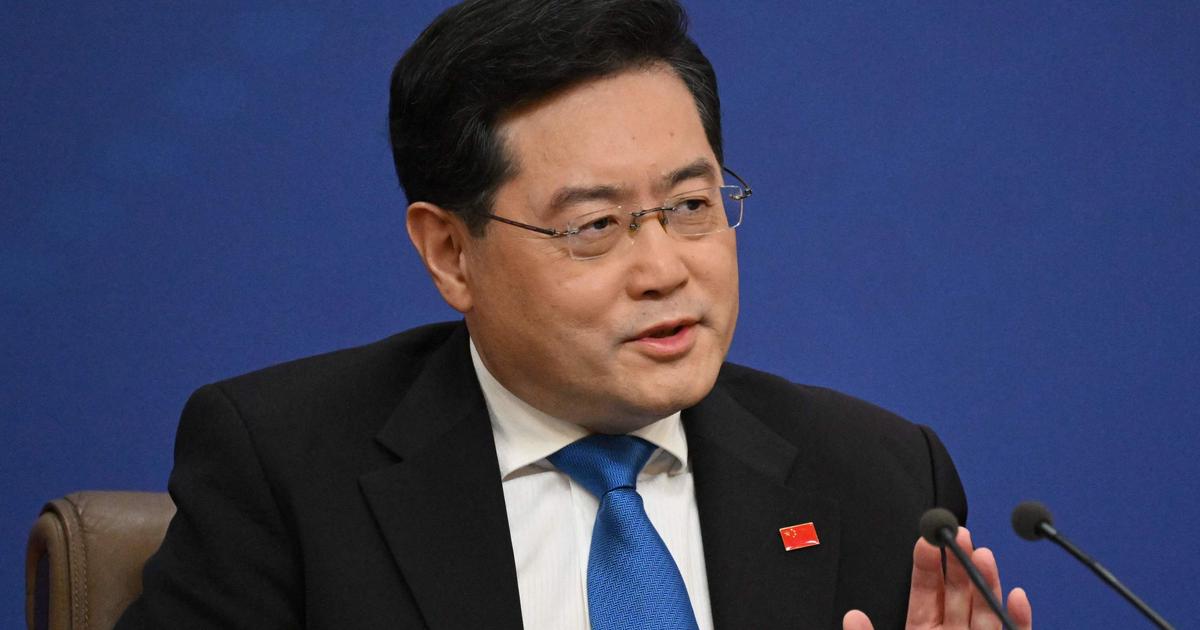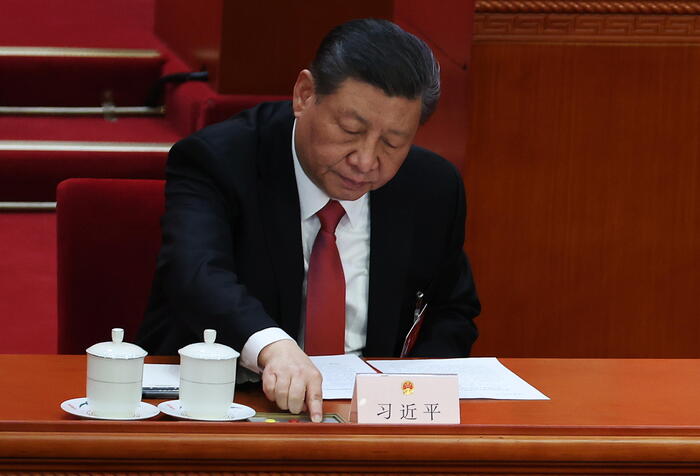Tough debates shortly before the Chinese Communist Party congress: "Xi Jinping has clearly lost power in the party"
Created: 09/23/2022, 13:38
From: China.Table
Applause for Xi: Delegates to the National People's Congress, China's legislature, clap at the president's entrance.
At the upcoming party conference, the optics should be the same.
But nobody knows how many power struggles are going on in the background.
© Noel Celis/afp
The 20th Party Congress of the CCP will start in a few weeks.
In an interview, the sinologist Klaus Mühlhahn talks about the character of Xi Jinping, the diversity of the party and possible opportunities for Germany.
Klaus Mühlhahn is a sinologist, social and cultural scientist.
He has been President of Zeppelin University in Friedrichshafen since June 2020.
Mühlhahn is the author of several books on China.
Mühlhahn assumes that there will be hard fighting for important posts behind the scenes in the Communist Party.
Before the party congress in October, party leader Xi cannot simply decide everything.
This interview is
available to IPPEN.MEDIA
as part of a cooperation with the
China.Table Professional Briefing -
China.Table
first published it
on September 19, 2022.
Mr. Mühlhahn, the 20th Party Congress of the Chinese Communist Party begins on October 16 in Beijing. What are the big issues?
Undoubtedly Xi Jinping's third term.
That's big.
But other questions are really exciting.
Namely?
What will the new Politburo look like?
Like the Central Committee?
Everywhere there will be an enormous exchange of personnel.
And heads determine political orientations.
But unfortunately nothing gets out. What does that mean: great unity in the CP or fierce fighting behind the scenes?
Good question.
Two party congresses back when Xi Jinping came to power, a number of names were publicly circulating.
Xi was clear, as was Li Keqiang.
It's completely different this time.
China's communists: Xi will remain at the top - but who will become PM?
Xi is clear again. He will remain at the head of the party.
Yes, absolutely.
But you won't be able to name the new prime minister, will you?
And that a few weeks before the party congress.
That's very unusual and hasn't happened for a long time.
also read
Putin's partial mobilization: Thousands of Russians reportedly volunteered - air alert in Zaporizhia
"Will not organize a massacre": Putin politician surprises with commitment to nuclear weapons
And you skilfully avoided my question: What do you think is behind the current secrecy?
So, the date for the party conference is fixed.
That means the decisions have now been made.
Nevertheless, I suspect that there was fierce trench warfare internally for the individual posts.
Fierce trench warfare – what does that mean for the big picture?
That would suggest that Xi couldn't easily rule Jinping, and that Xi is not as unchallenged in the party as many overseas believe.
Sinology Professor Klaus Mühlhahn, President of Zeppelin University Friedrichshafen © Zeppelin University/Ilja Mess
China's CP: Tough selection process for political advancement
If there are no clear announcements, but rather several candidates, the selection process is all the more important. How would you describe that?
Hard very hard.
This basically starts even before the actual selection process.
Why?
If they want to become something in China's politics, they only have a very small window of opportunity.
Let's say you want to be in the Politburo, you can only do it in four specific years of your life: you must be between your late fifties and early sixties.
Otherwise, due to the strict age limit, they will not be able to manage two terms of office of five years each.
The pressure for a career politician must be enormous.
And the consequences for the country are also serious.
Because it means: Because of this rule, even in a huge country like China, very few people are eligible for political leadership.
Maybe just a few 100 people.
This puts incredible pressure on the people involved.
And then I have to get a job too. But how?
There are various groups within the party, each trying to push their own candidates through.
The history of the People's Republic of China from 1949 to the present
View photo gallery
Who is there?
For example, the Chinese youth association.
He is currently prominently represented by Li Keqiang and his people, for example.
Another large group are the princelings, people like Xi Jinping whose parents have held leadership positions within the party.
There is also the influential Shanghai Group.
The inland provinces also form a group in order to coordinate closely with each other and assert their own interests.
And between all these groups there is a complicated selection.
Because of this diversity, it is unthinkable that all members of the Politburo come from, say, the Shanghai Group, powerful as that group may be.
So even in an undemocratic one-party state like China with strongly autocratic tendencies, Xi Jinping has to balance the various interests.
So Xi Jinping isn't the much-cited autocrat? When he lifted the term limit for himself two years ago, many believed he was finally in charge. How has the situation changed since then?
Xi has clearly lost authority and credibility in the party.
And that has two main reasons.
First: The corona pandemic has hit the country enormously.
And Xi's Covid policy has been heavily criticized.
Secondly, the economic situation is very tense.
The two combined put pressure on Xi and weakened his position overall.
China: How powerful is head of state and party leader Xi Jinping?
Why did Xi remove the term limit in the first place?
Well, that's probably because of how the term and age limits are perceived by the leadership itself.
They are only allowed to compete twice and must also be around 60 years old to get into the lead.
So it makes sense to regard such a system as an obstacle.
Let's compare it with America: The last two presidents would have dropped out there before the selection process.
Also numerous senators.
And here in Germany, too, many active politicians would have to go.
What do you mean by that: These rules are nonsense?
I did not say that.
But you have to take note of the official reasoning – and many in China beyond Xi Jinping understand it: In an acute crisis situation, a president should not be removed from office simply because of a bureaucratic rule.
But the repeal only applies to Xi, and not in general.
The constitutional amendment applies not only to Xi, but to any future president in general.
However, there is a problem here: the arbitrariness with which the change was enforced.
Xi apparently thinks that there is currently no reliable successor for him.
It is very striking that no other person is used for this position.
I think that's the key point: Xi's belief in his own irreplaceability.
And do you agree?
Seen as objectively as possible: Xi Jinping is someone at the helm of China who is leading the country with incredible energy and consistency - that also applies if you don't approve of the direction in which he is leading the country.
The man has public appointments every day and travels all over the country.
Xi handles an insane workload.
Xi Jinping: Close to the people with populist traits
Probably belongs to the post of President.
Not necessarily.
This is not the case for his predecessor Hu Jintao, for example, who appeared far less in public.
And the much admired Deng Xiaoping spent half the day playing mahjong in Zhongnanhai.
Xi is also very close to the people, he has almost populist traits.
In addition, he has the huge apparatus under control.
That's amazing given the size of the country.
Not everyone can do that.
From this perspective, one has to say: Xi Jinping is an effective president.
That's why he still has a lot of support among the Chinese population, despite the mistakes in fighting Covid mentioned above - which are often blamed on lower levels as well.
Oh, you'll offend some readers with this verdict.
I have to endure this.
But of course there is also my external perspective as a western foreigner on Xi.
And does it look different?
Absolutely.
Here you have to realize that Xi is extremely brutal and aggressive in many areas, for example on issues such as Xinjiang, Taiwan or Hong Kong.
Here he takes many and also great risks.
What are the biggest risks for Xi?
At the moment it is clearly the bad economic situation.
Xi knows that without economic growth, the entire government becomes extremely vulnerable - and not just to criticism.
That's the deal with the population, which accepts the restriction of political rights for economic growth.
When that ceases to apply, when banks collapse, a housing crisis wipes out savings, when people stop getting their money, when prices rise -- all of which will put Xi in a big bind.
And how is he doing?
It must be said that Xi does not have any good solutions in this area.
One has the impression that every fire is hectically extinguished.
But there is no discernible strategy for tackling the fundamental problems.
China: New generation of CCP cadres is more cosmopolitan
Do the geopolitical developments - the rivalry with the USA, the Ukraine war, Taiwan or the South China Sea - play no role at the party congress?
Yes, it is - in many respects.
The international aspect will also play an important role in the selection of personnel, because there is great concern that the current upheavals will increase.
In my view, there is no scenario in which China does not depend on the world.
That means you expect an opening after the party congress?
Yes.
This is also due to the people who are now moving up.
Look, Xi Jinping belongs to the last generation that was affected by the Cultural Revolution.
The new guard was born afterwards.
You studied in the liberal 1980s, many of them at Peking University in 1989, when the demonstrations were on.
This generation is socialized very differently.
You addressed 1989. At that time there was a break in the way other countries looked at China - and many Chinese feel their country was judged unfairly.
Right, and that still holds true today.
So I think the new generation will be more cosmopolitan, but not necessarily less nationalistic.
Nationalism was, and still is, the glue that bridges tensions and rifts within China in those years.
Policy towards the US will not necessarily improve, but there is a chance for more openness.
In Europe, too, the attitude towards China is currently becoming much more critical.
It's not wrong to be critical of China either.
But it's important that we stay in touch during the current phase - even if it's just to talk about differences.
The Americans do it much better, they continue to hold intensive confidential talks with the Chinese despite their verbal armament.
Here in Germany, mistrust is currently so great that almost every conversation is interpreted as complicity.
So what does the party congress mean for Europe and Germany?
Especially with regard to the new generation of leaders, I see great opportunities for us Europeans to work together better.
We need dialogue again.
Europe cannot afford to see China become a total black box.
The interview was conducted by Michael Radunski.
For many years, Michael Radunski
reported on politics, business, culture and sport from India and China.
His stay in China's capital, Beijing, had a particularly strong impact on him.
Before his stay in Asia, Michael Radunski worked for the
FAZ
, where he worked on the newspaper's online presence, among other things.
Radunski serves as editor of the
China.Table Professional Briefing
.
This interview appeared on September 19, 2022 in the China.Table Professional Briefing newsletter - as part of a cooperation, it is now also available to the readers of the IPPEN.MEDIA portals.






